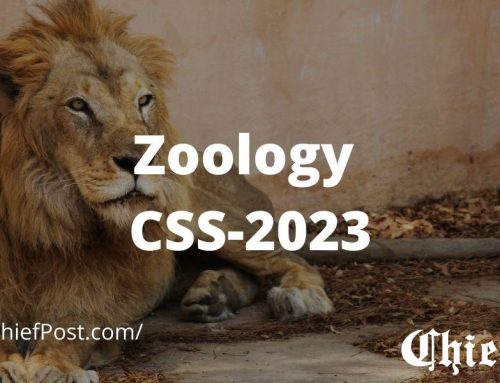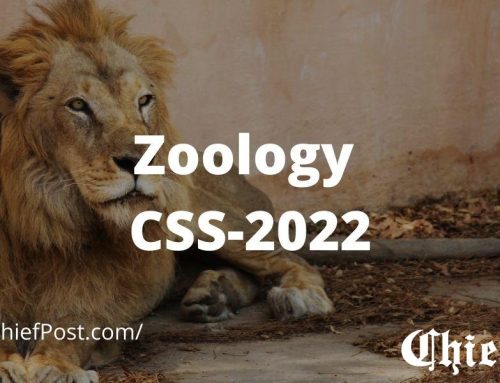
Zoology 2018 — CSS Past Paper
FEDERAL PUBLIC SERVICE COMMISSION
COMPETITIVE EXAMINATION-2020 FOR RECRUITMENT TO POSTS IN BS-17
UNDER THE FEDERAL GOVERNMENT
ZOOLOGY 2018
TIME ALLOWED: THREE HOURS
PART-I(MCQS): MAXIMUM 30 MINUTES
PART-I (MCQS) MAXIMUM MARKS = 20
PART-II MAXIMUM MARKS = 80
NOTE:
- (i) Part-II is to be attempted on the separate Answer Book.
- (ii) Attempt ONLY FOUR questions from PART-II. ALL questions carry EQUAL marks.
- (iii) All the parts (if any) of each Question must be attempted at one place instead of at different places.
- (iv) Candidate must write Q. No. in the Answer Book in accordance with Q. No. in the Q.Paper.
- (v) No Page/Space be left blank between the answers. All the blank pages of Answer Book must be crossed.
- (vi) Extra attempt of any question or any part of the attempted question will not be considered.
PART-II
Q. No. 2.
Discuss in detail how do the marine and terrestrial animals meet the problems of salt and water balance?
(20)
Q. No. 3.
Differentiate between endocrine and exocrine glands. Through how many kinds of receptors do the hormones act and how is the secretion rate controlled?
(20)
Q. No. 4.
Arthropod exoskeleton is the most complex of invertebrate integuments. Describe its structure and explain the difference in the way the cuticle is hardened in Crustaceans and in insects.
(20)
Q. No. 5.
Members of such a large and diverse phylum as mollusca impact humans in many ways. Discuss. Also name classes of the phylum with two differential characters for each.
(20)
Q. No. 6.
(a) Discuss parasitic adaptation and medical importance with respect to nematodes.
(b) Write note on structural and functional adaptation in mammals.
(20)
Q. No. 7.
Metamerism profoundly influences virtually every aspect of annelid structure and function, such as the anatomical arrangement of organs that are coincidentally with Metamerism. Discuss through logical reasoning.
(20)
Q. No. 8.
Write short notes on any FOUR of the following: (05 each)
(a) Gas exchange in reptiles
(b) Carbohydrates: Nature’s Most Abundant Organic Substance
(c) Mendel’s Law of inheritance
(d) Food chain
(e) Social Behaviour and its impact on individuals
(f) Composition of blood
(20)
**********










